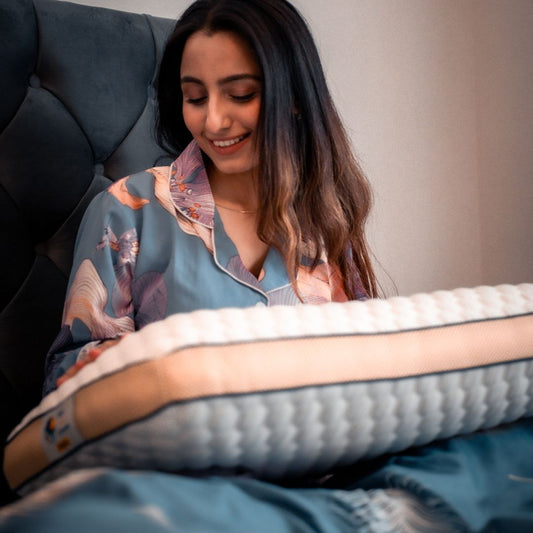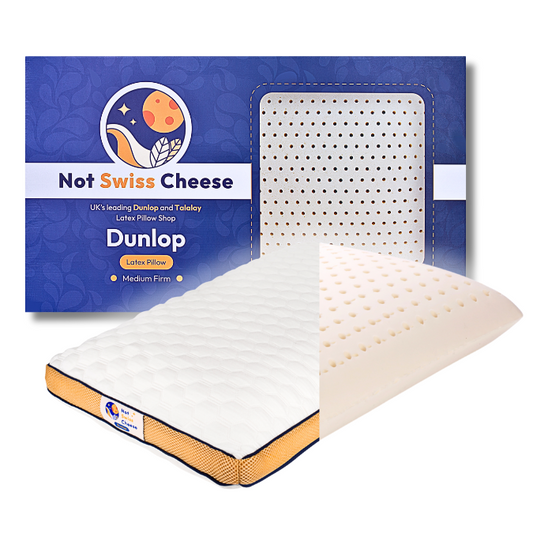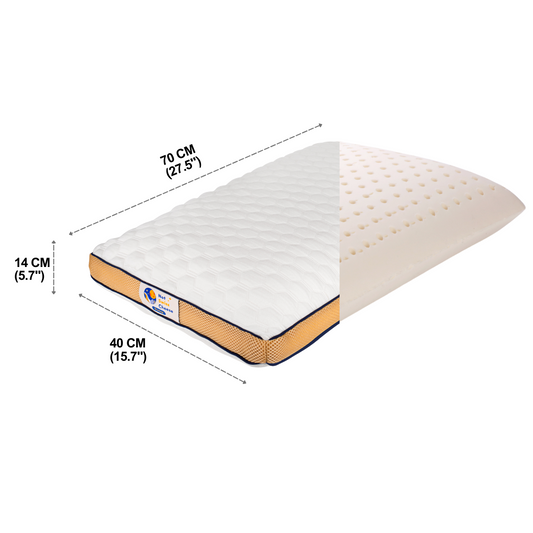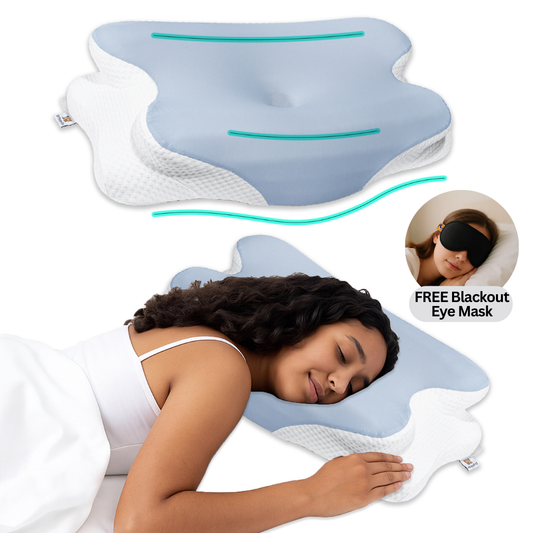Want to keep your brain sharp as you age? Focus on better sleep. Research shows that quality sleep supports brain plasticity - the brain's ability to adapt and learn - even as we grow older. Deep sleep is especially important for memory and cognitive health, but it declines with age, making it harder to retain information.
Key Takeaways:
- Deep Sleep Matters: By age 60, you may lose up to 70% of deep sleep compared to your 20s, affecting memory and brain function.
- Poor Sleep Risks: Insufficient sleep doubles the risk of Alzheimer's and speeds up cognitive decline.
- Practical Tips: Stick to a sleep schedule, keep your bedroom cool (65°F), and avoid screens before bed.
- Boost Sleep Naturally: Foods like tart cherries and kiwis can improve sleep, while aerobic exercise enhances sleep quality.
Improving sleep isn't just about rest - it's a key to maintaining memory and slowing brain aging. Let’s explore how sleep and brain health are connected and what you can do to protect your mind as you age.
Sleep, Brain Changes, and Getting Older
How the Brain Changes and Learns
As we age, the brain undergoes changes that affect how we learn and remember. Even without conditions like dementia, cognitive abilities naturally decline over time. This decline stems from both the loss of brain cells and the reorganization of neural circuits.
Research shows that older brains take longer to process and store new information. For example, studies on older mice reveal they need more time to learn new tasks. These changes in the brain underline the growing importance of sleep in maintaining mental function.
Sleep's Effects on Brain Health
With these age-related brain changes, the restorative role of sleep becomes even more important. During slow-wave sleep, the brain consolidates memories, maintains synaptic connections, and resets itself. Interestingly, just one night without sleep can make the brain appear 1–2 years older, based on predictive models. Fortunately, a single night of recovery sleep can reverse this effect.
Sleep Changes in Older Adults
As people get older, their sleep patterns shift in several ways. On average, total sleep time decreases by about 10–12 minutes per decade during adulthood. Key changes include:
| Age-Related Sleep Change | Impact on Sleep Quality |
|---|---|
| Decreased Deep Sleep | Reduced time in restorative slow-wave sleep |
| Increased Night Wakings | Frequent awakenings and longer periods of wakefulness |
| Earlier Sleep Schedule | A natural tendency to go to bed and wake up earlier |
| More Daytime Napping | Higher likelihood of napping compared to younger adults |
These shifts can significantly affect cognitive performance. Many older adults face chronic sleep difficulties, often accompanied by daytime fatigue.
"When we get older, we tend to feel sleepy earlier in the evening. This may result in waking up early in the morning as our sleeping hours shift. Older people have less REM and less slow wave sleep. Less slow wave sleep may impede memory consolidation in older adults."
- Margaret O'Connor, PhD, ABPP
Physical factors also play a role in sleep disruption for older adults. Nocturia (frequent nighttime urination) affects up to 80% of older individuals, while conditions like restless legs syndrome impact between 9% and 20% of the elderly population. These issues can significantly reduce both the quality and duration of sleep, potentially speeding up cognitive decline linked to aging.
The brain benefits of deep sleep and how to get more of it
Deep Sleep and Brain Function
Let's dive into how deep sleep helps keep the brain sharp as we age.
Sleep Stages and Their Role
Deep sleep, or slow-wave sleep (SWS), is crucial for brain health, especially as we grow older. It's during this stage that the brain handles tasks like memory consolidation and restoration. Research shows that by the time someone reaches 60, they may have lost up to 70% of their deep sleep compared to their younger years (age 25 and under).
Here’s a breakdown of the sleep stages and what they do:
| Sleep Stage | Duration | Primary Functions |
|---|---|---|
| Light Sleep (N1) | 5–10 minutes | Transition between wakefulness and sleep |
| Light Sleep (N2) | 20–30 minutes | Basic memory processing and temperature regulation |
| Deep Sleep (N3) | 20–40 minutes | Memory consolidation |
| REM Sleep | 10–60 minutes | Emotional processing and learning |
These stages are essential for supporting memory and other brain functions.
Deep Sleep and Memory
Deep sleep plays a key role in transferring memories into long-term storage, which becomes even more important as we age. A study from Northwestern Medicine found that boosting deep sleep can significantly improve memory in older adults. The researchers used gentle sound stimulation synchronized with brain waves, and participants' memory recall improved by 200% on nights when they received this stimulation.
"This is an innovative, simple and safe non-medication approach that may help improve brain health. This is a potential tool for enhancing memory in older populations and attenuating normal age-related memory decline."
- Dr. Phyllis Zee, professor of neurology at Northwestern University Feinberg School of Medicine
On the flip side, not getting enough deep sleep can harm memory and speed up mental decline.
Poor Sleep and Cognitive Decline
Every additional symptom of insomnia increases the risk of mild cognitive impairment and dementia by 5% over a 12-year period. Poor sleep efficiency can double the likelihood of developing mild cognitive impairment, and women with the lowest sleep efficiency are 1.5 times more likely to experience cognitive issues.
Research from UC Berkeley revealed that older adults experience a 75% decline in deep sleep quality compared to younger individuals. This decline is linked to a 55% drop in memory test performance.
"What we have discovered is a dysfunctional pathway that helps explain the relationship between brain deterioration, sleep disruption and memory loss as we get older – and with that, a potentially new treatment avenue."
- Matthew Walker, Associate Professor of Psychology and Neuroscience at UC Berkeley
Deep sleep may also act as a buffer against age-related brain changes and the buildup of proteins associated with Alzheimer’s. This has led to ongoing research into methods for improving deep sleep, which could help preserve cognitive function as we age.
sbb-itb-7fb8e9c
Better Sleep Tips for Older Adults
Sleep Habits That Work
Building consistent sleep habits is key to maintaining brain health. Dr. Brienne Miner, MD, MHS, Assistant Professor of Medicine (Geriatrics), highlights:
"That means going to bed at the same time every night and getting out of bed at the same time every day. That's probably the single best thing you can do to improve your sleep."
To create a sleep-friendly environment, try these steps:
- Limit screen time at least an hour before bed
- Practice relaxation techniques like deep breathing or taking a warm bath
- Keep your bedroom dark, quiet, and cool
Besides these habits, your diet and exercise routine also play a big role in how well you sleep.
Food and Exercise for Better Sleep
Aerobic exercise has been shown to improve sleep quality. Research from Northwestern University revealed that participants went from poor sleepers to good sleepers after completing four weekly sessions of either two 20-minute workouts or one 30-40-minute session at 75% of their maximum heart rate.
Certain foods can also promote better sleep:
| Sleep-Promoting Foods | How They Help |
|---|---|
| Tart Cherries | Boost melatonin production naturally |
| Kiwi | Improve how quickly you fall asleep and how long you stay asleep |
| Whole-grain Rice | Provide nutrients that support restful sleep |
| Turkey | Contains tryptophan, which aids relaxation |
Clinical studies back this up. For instance, adults over 50 with insomnia reported better sleep after drinking tart cherry juice. Eating two kiwis an hour before bed also helped people fall asleep faster and sleep longer.
Natural Latex Pillows and Sleep Quality
For even more restful sleep, consider upgrading your pillow. Natural latex pillows are designed to offer neck support and lasting comfort. Sleep Expert Elina Winnel explains that these pillows provide breathable, durable support.
Here are two popular options:
- Talalay Latex Pillow ($74.99): Medium-soft support made from 99% natural rubber.
- Dunlop Latex Pillow ($54.99): Firmer support with 70% natural rubber.
Both options come with added benefits:
- Retain their shape for up to 10 years
- Hypoallergenic and resistant to dust mites
- Excellent temperature regulation
To keep your latex pillow in top condition, rotate it regularly and use a pillow protector. Avoid exposing it to moisture or machine washing to preserve its quality.
Latest Sleep Research and Studies
New Sleep Treatment Methods
A cutting-edge "sleep pacemaker" for obstructive sleep apnea (OSA) has shown an 80% success rate in trials. Alongside this, digital therapies are transforming sleep treatment approaches. For instance, a December 2024 study involving 188 older adults found that combining digital CBT-I with medication tapering helped 73% of participants successfully stop using sleep medications.
"We're starting to understand the long-term health consequences of sleep apnea, but patients are mostly unaware."
- Dr. Kathryn Kreicher, Cedars-Sinai Otolaryngologist
The sleep pacemaker works by monitoring breathing patterns through an electrode placed on the hypoglossal nerve and a respiratory sensor on the chest wall. It stimulates the tongue to keep airways open, offering a new way to manage OSA. This aligns with the broader goal of improving sleep quality to support brain health, particularly in older adults.
Current Sleep Science Studies
Ongoing research continues to explore the connection between sleep and brain health. For example, wearable device data from over 6,500 adults has linked reduced REM and deep sleep to a higher risk of atrial fibrillation.
Recent studies have highlighted key insights into how sleep patterns affect the brain:
| Sleep Pattern | Brain Impact | Study Finding |
|---|---|---|
| Under 6 hours | Memory decline | Linked to higher amyloid-beta levels and impaired cognition |
| Total sleep deprivation | Temporary aging | Brain appeared 1–2 years older but reversed after recovery sleep |
| Over 9 hours | Decision-making | Associated with cognitive challenges |
"These findings show how important sleep is for our brains, especially as we get older. Getting enough good sleep can help keep our minds sharp and our overall health strong."
- Dr. Shelby Harris, clinical psychologist and sleep health director at Sleepopolis
"Even if the cause of dementia is unrelated to sleep, it's possible that poor sleep may advance or exacerbate cognitive symptoms."
- Dr. Clémence Cavaillès
Participants with moderate sleep issues (22% of the group) showed brain aging equivalent to being 1.6 years older than their actual age. Those with severe sleep problems (8%) experienced brain aging equivalent to 2.6 years older. These findings reinforce the importance of sleep for cognitive health and suggest that addressing sleep problems early could help slow down brain aging. They also emphasize the protective benefits of deep sleep, as noted in earlier studies.
Conclusion
Based on the research and sleep strategies mentioned earlier, improving sleep quality can play a key role in protecting brain health as we age. Studies show that sleeping less than seven hours or more than nine hours can raise the risk of silent brain injuries, which are linked to conditions like stroke and dementia. This underscores the importance of adopting practical sleep habits grounded in science.
"These findings add to the mounting evidence that sleep is a prime pillar of brain health"
- Dr. Santiago Clocchiatti-Tuozzo, Yale School of Medicine
Here are a few steps to help maintain brain health through better sleep:
- Optimize Your Sleep Environment: Keep your bedroom cool, dark, and quiet. A natural latex pillow can help regulate temperature and provide proper neck support.
- Stick to a Sleep Schedule: Going to bed and waking up at the same time daily helps your body stay in sync with its natural sleep-wake rhythm.
- Prioritize Physical Comfort: Research suggests that ergonomic latex pillows can reduce pain and improve neck mobility. Feeling physically comfortable promotes the deep, restorative sleep that benefits memory and brain function.
Related Blog Posts
- "Does improving sleep lead to better mental health
- Sleep loss amplifies basic emotional reactivity, increasing negative mood states
- The Relationship Between Quality of Sleep and Emotional Empathy
- Human longevity is associated with regular sleep patterns, maintenance of slow wave sleep, and favorable lipid profile








